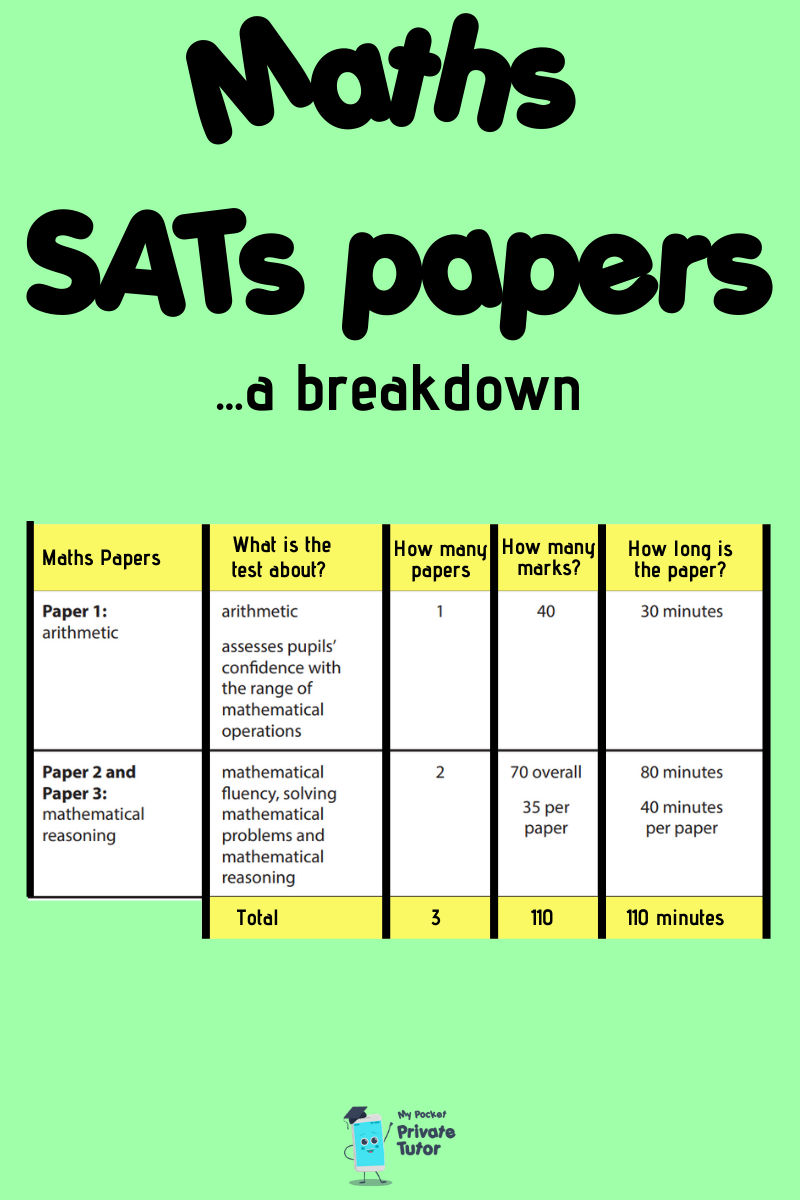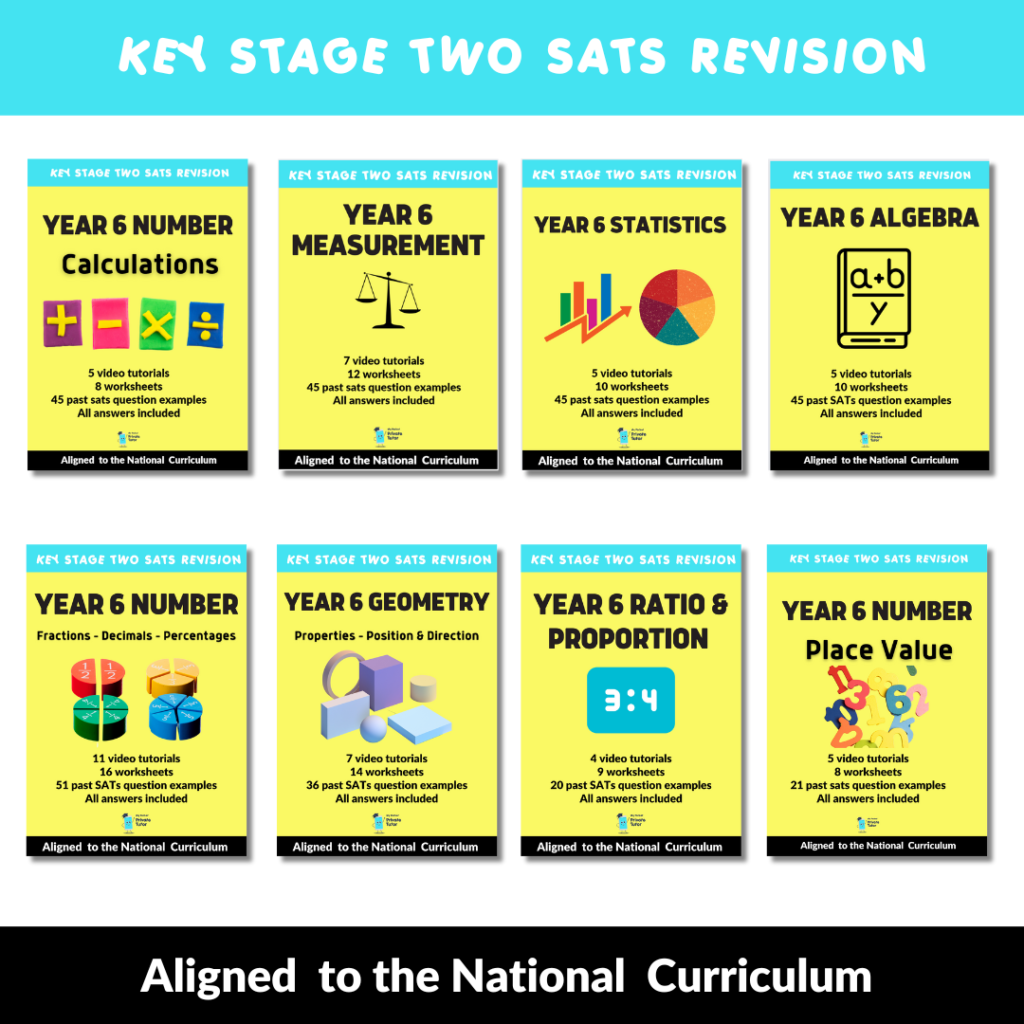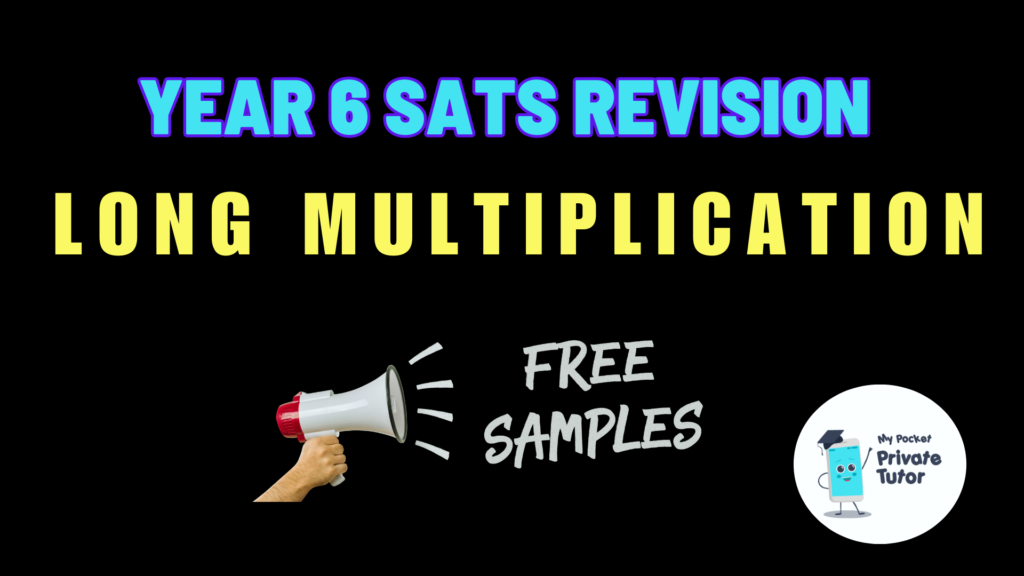What are the Year 6 SATs tests?

The Year 6 SATs tests are to assess your child’s understanding of Maths and English against the National Curriculum learning objectives from Key Stage Two (Year Three to Year Six). Primary school is split into two stages after Reception: Key Stage One and Key Stage Two. At the end of each key stage, children sit a SATs test. This stands for Standard Assessment Test which will cover Maths and English. They include a reading paper, a grammar punctuation and spelling paper (often referred to as SPAG) and maths. In this article, I will be discussing the Key Stage Two tests with a specific focus on the maths papers.
The purpose of the SATs is to measure academic progress throughout each of the key stages.
When are the Year 6 SATs tests?
The Year 6 SATs tests take place in May from Monday to Thursday. There are no tests on the Friday. All schools in the UK will sit the tests on the same day, they usually take place in the morning.

What are the Year 6 SATs maths tests like?
Each paper usually takes place in a classroom or familiar room within the school. Papers are sent away to be externally marked and there are stringent procedures in place to make sure that the tests are administered fairly. Some children may qualify for additional support and sit separately but there are strict guidelines in place to specify who “qualifies” for that additional support. Children may ask for things to be read to them from a paper but will not be allowed to ask questions such as “What does multiple mean?” The maths assessments are split into three papers as shown in the diagram. See above for the dates for each paper. You can read more about the arithmetic paper here and the reasoning papers here. You can also join my Year 6 SATs Facebook Group where you can engage with other Year 6 parents to get tips and info and ask me any questions directly.

How are the Year 6 SATs scored ?

Tests are sent away to be externally marked and then are returned with a raw score, a scaled score (unless the raw score was too low) and then either a ‘NS’ (not achieved) or ‘AS’ (achieved).
The raw score is the actual number of marks from the 110 available. The scaled score converts the raw score using a system which takes into account the difficulty of each test compared to previous years. A child must score 100 to achieve ‘AS’. In 2022, 58 marks were needed to get a scaled score of 100. In this year, the UK had the lowest SATs scores across the country in maths since they began. In 2023, the scaled scores were lowered and 56 marks out of the possible 110 were enough to get an ‘AS’. Who knows what will happen in 2024!
You can read more here
Does my child have to sit the Year 6 SATs?
The SATs tests are currently compulsory although the Key Stage One SATs will no longer be statutory from 2024. Key Stage Two tests look like they will be around for the foreseeable.
If you have concerns about your child sitting the SATs, a conversation with your child’s teacher or head-teacher is the way to go as there may be circumstances in which a child can be withdrawn.
How are the Year 6 SATs scores used ?

The SATs scores are used to show academic progress in primary schools. Schools are actually judged by the percentage of their children reaching “expected” academic levels but they’re also judged by the progress their children make. Progress is judged using the assessed levels of children when they were in Reception and their Key Stage One tests and comparing them to their end of Key Stage Two level. Schools and teachers are expected to facilitate all children to make a specified degree of progress. If children were showing high academic levels in their early years but then failed to make expected levels at the end of Key Stage Two there are many questions asked. Scores are also published in League tables so there is a lot of pressure on schools and teachers to deliver good results.
As far as how secondary schools use the SATs results, they will of course use them as an indicator of your child’s ability however they will more than likely also use their own baseline assessments and will continue to do their own assessments throughout your child’s journey in secondary school. So if your child’s SATs results don’t reflect their true ability in their SATs (something more common than you would think) it does not mean that the rest of their schooling journey is written off! There is always a chance to progress and show what they are really capable of.
Are the Year 6 SATs tests important ?

Yes they are important. It may be one of the first times that your child will be fully aware of the process of preparing for something important that they will be assessed on. If your child already has a hobby that involves grading or studies a musical instrument then they will probably already be experienced in practising for an exam, wanting to pass it and receiving a result that may either reward them for their efforts or alert them to the fact that they need more practise. That’s exactly what the SATs test do.
If they don’t receive the results they wanted of course it is not the end of the world however it is a great learning point for them. If children at this age begin to understand the importance of having to put effort in to achieve, it’s a great lesson for life. You will always get some children that need to revise very little and still get a good result but you will find that those children as they get older may struggle more and more as tests get harder and “natural ability” is no longer all that is needed.
Studying for the SATs is really just as much about the journey as the result.
It’s about developing good lifelong habits and creating an awareness in children that if they want good results they need to be not only working hard but also working smart. By that I mean giving them tools to identify their own areas of strengths and weaknesses so that they can target their weaknesses to enable them to improve. Then its a case of practice, practice, practice!
What should I do if my child is too stressed about Year 6 SATs?

If your child is feeling stressed or under pressure, then you need to explore the why. Avoiding situations that are stressful are not necessarily the best for their future development. It may be that there are circumstances in their lives which are causing issues and of course, in those scenarios, a test is really not important in a bigger picture. However, if like many, there are other factors at play…they are nervous that they will fail, they don’t feel like they are as good as their peers, they forget things in a test environment, then the focus should be on helping them overcome these barriers as there will be many more test situations coming their way in secondary school. I will do a separate blog on helping children with pressure. There are a wealth of resources out there on mindfulness techniques, ways to help memory, and simple things like ensuring a good diet and quality of sleep all help. This is an opportunity for children to learn about facing something intimidating but feeling proud afterwards. Lets teach our children that it’s okay to be worried about something but the importance is in the trying. Resilience is a lifelong tool that can help us all.
How can I support my child in their Year 6 SATs?

Firstly and foremost, engage with the school. Every school has their own approach and their own way of structuring revision. This year, they will have it even tougher because of the school closures. Schools will usually give SATs focused revision throughout the year. There is a lot of content to cover so while we want our children to learn and be productive we also need to manage the pressure so that it doesn’t move from a healthy pressure to causing anxiety and stress. There is a fine line and I will be covering more on wellbeing this year in our Year 6 Facebook support group and the Pocket Private Tutor mailing list.
There are a wealth of resources on the internet, but you need to make sure that any content you use is relevant to the National Curriculum and that children are focusing on developing their weaker areas not just spending time doing maths they already know. Speaking with your child’s teacher and your child themselves will help you identify the areas they need to focus on. You can also download a free copy of the Year 6 National Curriculum maths objectives here and use this to keep track of what your child needs to know and focus on.
A 1:1 tutor is invaluable but not suitable for everybody. Time, finances, space, there are a lot of factors which prevent this from being an option. Pocket Private Tutor provides support in a variety of ways which you can use at your own convenience. There are plenty of free maths tutorials, tips, info and puzzles on our Instagram account, YouTube, Facebook support group or by signing up to our free resources.
The most comprehensive and affordable Year 6 Maths Resources

Last but not least, my SATs Ebooks cover every single National Curriculum learning objective for mathematics with a video tutorial, easy to follow worksheet and past SATs questions. Children can choose any of the topics to suit their needs and the programme is designed to be used independently. You need access to a phone, tablet or laptop to watch the video and ideally be able to print out the worksheets. There are 6 free sample lessons available to get a feel for how it works- check them out on my YouTube Channel.
The Year 6 SATs (affectionately referred to as the Silly Annoying Things by my headteacher) are not something to be feared. It is a chance to see how much your child has not only learned but retained. It gives them an opportunity to reflect and sets them up for success in secondary school. Year 6 is an important year, it is a big milestone and preparing early will make a huge difference to your child’s experience of the SATs next May.
I would love you to join my Year 6 SATs Facebook Group where I will be posting tips and short clips focusing on Year 6 maths and I will share ideas on how to use the Pocket Private Tutor app to help your child gain confidence with maths and feel prepared for the Year 6 SATs.







Leave a comment
Sign in to post your comment or sign-up if you don't have any account.